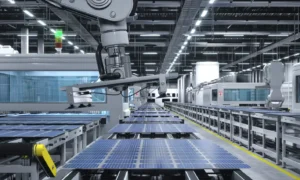Not just residential solar installation is becoming the first choice for homeowners but also for those who tend to embrace energy independence and environmental responsibility. In this comprehensive guide, we explore the key issues regarding solar installation for homeowners starting from identifying the relevant details of solar as a source of energy to overcoming the obstacles associated with installation and realizing savings.
Whether it is your first time thinking about having solar or you are already utilizing the system and aiming to upgrade it, the following guide will provide all the essential knowledge that will enable you to make the most of solar through your home.
Understanding Residential Solar Installation
Home solar installation is the adoption and placement of solar panels in houses to capture sunlight and eventually convert it to used electricity. Unlike traditional energy sources that draw on limited natural resources, solar energy enables us to practically bypass the grid and cut down or even eliminate dependence on it.
Taking in the sun’s energy through the photovoltaic cells of solar panels, the result is clean, sustainable power that can power an array of appliances in households, including lighting and other electric devices.
The Solar Advantage: Benefits Of Going Solar For Homeowners
For homeowners, installing solar has a lot of advantages. First and foremost, solar power offers the remarkable benefit of lowering electric bills either completely or significantly. Then, solar panels enhance the marketability of your house and can serve as a potentially profitable investment in the long run.
Also, solar energy by lessening the use of fossil fuels contributes to mitigating climate change and a clean environment. In conclusion, solar installation provides energy independence, meaning the homeowners stand in charge of the electricity production and use.
Planning Your Solar Journey: Steps To A Successful Installation
The planning is a fundamental component in establishing a residential solar installation that is successful. The procedure generally starts with a consultant visit to examine your house’s compatibility with solar panels and come up with recommendations that will be according to your energy needs and budget. After that, you have to decide the size and the setup of your solar system, gather the required permission and pick a proficient installer to do the installation step. Proper planning helps to avoid all the problems that could be faced with installing the solar system.
Choosing The Right Solar System: Tailoring Solutions For Residential Needs
As the first step towards solar energy for your home, evaluating factors like energy used, roof space, and budget is crucial. Solar panel systems can be either made up of small apertures, such as rooftop panels to larger ones, such as ground-mounted arrays. A reliable solar installer will guide you in the selection of the right system for your unique options and priorities. Furthermore, you should decide on the kind of solar panels, for example, monocrystalline, polycrystalline, or amorphous ones, which each have their specific advantages.
The Installation Process: What To Expect When Going Solar
The installation process usually begins with a site assessment to gauge your home’s solar capacity accompanied by an evaluation of the most suitable site for solar panels. The installation crew will move ahead to install the panels after the design phase is completed. They will connect the panels to your home’s electrical system, mount the inverter and put in the monitoring equipment. Meanwhile, the installation process will be supervised by employees with experience, who will make sure that all components are installed properly and are safe and reliable.
Financing Solar Projects: Exploring Options For Residential Customers
The affordability of solar installation is a concern for homeowners since initial costs can be high. However, different financing options help in making solar power more accessible to homeowners. These are, for example, solar loans, solar leases, power purchase agreements (PPAs) and government grants such as tax credits and rebates. Financing options are not new, but with solar installation being the new trend, many homeowners can offset the initial cost of installation and enjoy long-term savings on their energy bills.
Maximizing Savings: Tips For Optimizing Solar Efficiency At Home
Solar installation for Lake Macquarie properties is crucial in order to get the savings. Start off by getting the right insulation and sealing done in order to avoid energy loss. Invest in energy-efficient appliances and lights to manage the consumption of power. Frequent solar panel maintenance is as important as its peak performance. The installation of a solar battery power storage system may help to store the surplus energy for future use. Adopting such ways of working, homeowners can experience the benefits of solar energy manifesting in cost recovery and a feasible solution for their properties.
Maintenance And Care: Ensuring Longevity And Performance Of Your Solar System
Continuously ensuring the availability of qualified solar installers in Lake Macquarie is a great way to guarantee the robustness and high-level efficiency of your solar system. Set up regular conveyances during which the panels, wiring and connections are checked for any problems.
Keep the panels clean by removing dirt, debris, and anything else that could shade and block the facility. Track system performance, investigate any anomalies and fix them in time. The installation of solar systems is a decision that will affect the house for years to come. Therefore, professional maintenance and care should be invested in to extend solar system lifespans and to guarantee efficiency continuous cost savings and positive environmental impact.
Conclusion
A home solar installation is a green method of self-powered homes thus the consumers’ expense is reduced as well as their environmental footprint is diminished. Through comprehension of the solar power benefits, thorough planning of your solar route, careful decision about the solar system energy saving and maximizing the efficiency, you will receive the knock-on advantages of the solar system. Using professional solar installers and giving due care to maintenance, you can enjoy energy independence, and you are also a part of a cleaner and greener future.



































